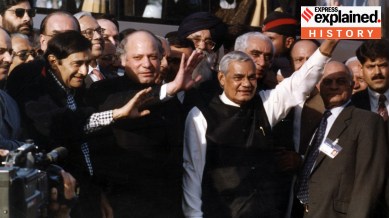Pakistan’s ‘fault’, says Nawaz Sharif: How Pervez Musharraf’s Kargil misadventure undid historic Lahore Declaration
Under the premierships of Nawaz Sharif and Atal Bihari Vajpayee, India and Pakistan seemed poised to put aside their differences. Then the Kargil War happened.

Former Pakistan Prime Minister Nawaz Sharif on Tuesday (May 28) said that Islamabad “violated” an “agreement” signed between him and India’s former Prime Minister Atal Bihari Vajpayee in 1999, in a reference to the Lahore Declaration and Pervez Musharraf’s Kargil misadventure.
“On May 28, 1998, Pakistan carried out five nuclear tests. After that Vajpayee Saheb came here and made an agreement with us. But we violated that agreement…it was our fault,” Sharif told a general council meeting of the PML-N in which he was elected president of the ruling party.
Sharif and Vajpayee signed the declaration on February 21, 1999, after the Indian Prime Minister’s historic bus ride to Lahore. But even as they were shaking hands, Pakistani soldiers were in the process of occupying unmanned high-altitude Indian positions in Kargil, Ladakh.
Here is what happened.
After nuclear tests, Vajpayee-Nawaz pursue peace
Less than two months after Vajpayee’s government took over on March 19, 1998, India conducted five nuclear tests between May 11 and 13, at the Army’s Pokhran Test Range in Rajasthan. Operation Shakti announced to the world India’s capability to deploy nuclear weapons.
A fortnight later, Pakistan responded with its own nuclear tests in the Chagai Hills of Balochistan. Suddenly, the subcontinent was among the most dangerous places on the planet. But Vajpayee had no intention of escalating the situation.
“Once India achieved its nuclear power status as did Pakistan, Atal felt that it was time that the two countries started working towards good relations,” Kingshuk Nag wrote in Atal Bihari Vajpayee: A Man For All Seasons (2016).
On September 23, 1998, the two governments signed an agreement recognising the principle of building an “environment of peace and security”, and “resolving all bilateral conflicts”. This agreement was to be the basis of the Lahore Declaration.
A historic bus ride across the border
In the afternoon of February 19, 1999, Vajpayee crossed the Wagah-Attari border by bus, where he was met by Nawaz. “This is a defining moment in South Asian history and we will have to rise to the challenge,” Vajpayee told the Pakistani leader (quoted in Kingshuk Nag).
Talks between Vajpayee and Nawaz culminated in the Lahore Declaration, in which India and Pakistan pledged to a peaceful resolution of bilateral disputes, including Kashmir, and fostering friendly commercial and cultural relationships. Both sides also agreed to engage in bilateral consultations regarding their nuclear doctrines, to avoid any nuclear conflict, whether intended or not.
But more than anything else, Vajpayee disarmed the Pakistani public with his frank demeanour and charming ways. He recited his poems (most notably, ‘Ab jung naa hone denge hum’ or ‘We will not let war break out’) and referred at the shared heritage of the two peoples.
During an event at Lahore Fort, the audience was so impressed by Vajpayee’s speech that Nawaz reportedly quipped: “Vajpayee sahab ab toh Pakistan mein bhi election jeet sakte hain (Mr Vajpayee can now win elections even in Pakistan)” (as quoted in Kingshuk Nag).
After the visit, the two countries began further negotiations on Kashmir. It seemed for a while that the two countries were finally on the path to a lasting peace. But Pakistan’s Army Chief General Pervez Musharraf had different ideas.
Musharraf’s misadventure leaves peace process in tatters
Nawaz made Musharraf Army Chief in October 1998. Unlike Nawaz though, he was not enthused about the thaw in the Indo-Pak relations. The military brass were not even present during Vajpayee’s Lahore visit — in fact, even as Vajpayee and Nawaz were shaking hands, heavily armed Pakistani troops, dressed up as Kashmiri militants, were busy crossing the Line of Control to occupy Indian positions in Kargil, left empty during Ladakh’s frigid winter.
Musharraf wrote in his memoir: “By the end of April the unoccupied gaps along 120 kilometers of the LoC had been secured by over 100 new posts, often to twenty persons each… Indians were completely oblivious of our new strength along the LoC” (In the Line of Fire: A Memoir, 2006).
According to former R&AW Chief A S Dulat, approximately “1,500 to 2,400 troops, both regular and irregular, were deployed by Pakistan for its Kargil intrusion” (Kashmir: The Vajpayee Years, 2015).
It was only in May 1999 that India began to realise the extent of the infiltration. By this time, Vajpayee had been reduced to being caretaker Prime Minister after losing a confidence motion in Lok Sabha by a single vote on April 17. But that did not come in the way of a resolute response by India.
The Indian Army, with the support of the Air Force, launched Operation Vijay in May 1999 and was able to reclaim the heights of Kargil by July 26, 1999. Despite strategic disadvantages (the Pakistanis occupied the high ground), and in the unforgiving conditions of the Himalayas, Indian forces prevailed. But more than 500 Indian soldiers fell in battle, and more than 1,300 were wounded.
And as Dulat wrote, “the peace process was in tatters”. No further bilateral discussions about Kashmir or any other subject took place between the two nations. Within months, Musharraf ousted Nawaz in a coup and took charge in Pakistan.